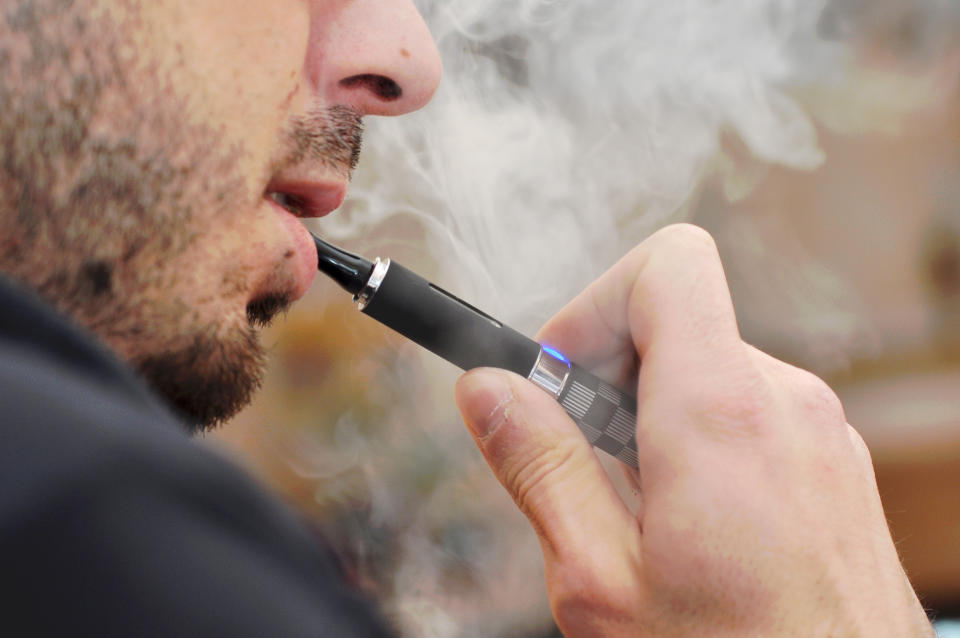Vape companies banned from promoting e-cigarettes on public Instagram pages
![Instagram e-cigarette posts banned by ad watchdog [Photo: Getty]](https://s.yimg.com/ny/api/res/1.2/Dhtvzo9vvKGU285_ye.maQ--/YXBwaWQ9aGlnaGxhbmRlcjt3PTEyNDI7aD02OTk-/https://media-mbst-pub-ue1.s3.amazonaws.com/creatr-uploaded-images/2019-12/9b36faa0-2185-11ea-9b5f-b34d228b0ee5)
A number of vaping companies have been barred from sharing posts on Instagram said to promote their products.
This is after the UK’s Advertising Standards Authority (ASA) ruled a number of vaping posts to be “promotional in nature”.
As current regulations stand, e-cigarette companies are prohibited from online advertising of their products – but permitted to provide factual information such as the name, content and price of their products.
British American Tobacco (BAT) and three other e-cigarette firms were said to have breached these rules on their Instagram accounts.
READ MORE: What is vaping and is it safe?
Examples include seven posts shared early this year by BAT for its e-cigarette brand Vype, featuring captioned pictured of singer Lily Allen, actor Rami Malek and model Olivia Jade Attwood.
The ASA’s investigation was a response to complaints by numerous health bodies, including Action on Smoking and Health, Campaign for Tobacco-Free Kids and Stop (Stopping Tobacco Organisations and Products). The ruling has been dubbed a “major step forward” by these organisations.
![The ASA is cracking down on Instagram posts said to promote vaping. [Photo: PA/Instagram]](https://s.yimg.com/ny/api/res/1.2/aTW8Hdt2gGdbnkG_E63kFA--/YXBwaWQ9aGlnaGxhbmRlcjt3PTk2MDtoPTUxNw--/https://media-mbst-pub-ue1.s3.amazonaws.com/creatr-uploaded-images/2019-12/79ec9950-2184-11ea-bfcf-c4772bc4d73c)
![An image issued by the Advertising Standards Authority (ASA) of Lily Allen promoting e-cigarettes which appears on Instagram. [Photo: PA/Instagram]](https://s.yimg.com/ny/api/res/1.2/RpVICTiaesbhRQK2Nc5Haw--/YXBwaWQ9aGlnaGxhbmRlcjt3PTk2MDtoPTU4NQ--/https://media-mbst-pub-ue1.s3.amazonaws.com/creatr-uploaded-images/2019-12/c78f9690-2183-11ea-ae3b-a36042bd4abd)
The ASA said: "We considered both mechanisms were consistent with content being pushed to consumers without having opted into to receive the message it contained and therefore that neither mechanism was equivalent to actively seeking out information about e-cigarettes.
"Given those characteristics, we considered that material from a public Instagram account was not analogous to a retailer's own website and that material posted from such an account was therefore subject to the prohibition on advertising of unlicensed, nicotine-containing e-cigarettes, meaning that neither promotional nor factual content was permitted,” added the body’s representative.
Professor Anna Gilmore, director of the Tobacco Control Research Group at the University of Bath, the research partner of Stop, said: "This is a major step forward in stopping the tobacco industry from promoting its new addictive products to children and teenagers.
READ MORE: Texas teen says he nearly died after vaping: 'I really couldn’t get a whole breath in'
"But given that cigarette sales are falling and tobacco companies are desperate to recruit young people into using these new products, ongoing vigilance is essential."
Deborah Arnott, chief executive of the charity Action on Smoking and Health, added: "The ASA ruling leaves no doubt that BAT's social media tactics for Vype were both irresponsible and unlawful and must never be repeated."
A Facebook spokesman, on behalf of Instagram, added: "We do not allow adverts that promote the sale or use of tobacco or electronic cigarettes.
"Earlier this year we updated our policy to restrict organic content that depicts the sale or purchase of tobacco products to over-18s. We are currently updating our branded content policies to no longer allow paid promotions of these products too."
Vaping and health
Vaping is a relatively new phenomenon, and at present the health advice surrounding its safety is conflicted.
However, earlier this year, the US Center for Disease Control and Prevention issued a statement telling people to stop using e-cigarettes pending investigation.
“While this investigation is ongoing, people should consider not using e-cigarette products,” Dr Dana Meaney Delman, who is leading an investigation into a lung disease said to be linked to vaping.
READ MORE: Vaping firm Juul reassures customers as lung disease fears grow
Yet, UK health groups continue to support vaping as a safer alternative to smoking.
"Numerous studies from health groups in the UK have concluded that using an e-cigarette, known as vaping, is better for your health compared to smoking,” Dr Diana Gall, from www.doctor-4-u.co.uk, told Yahoo UK back in September this year.

“A report by Public Health England, which was compiled by several UK-based academics, found that vaping is 95% safer than smoking. Cancer Research UK has also given its support to people using vaping as a means of fighting against smoking related diseases.”


